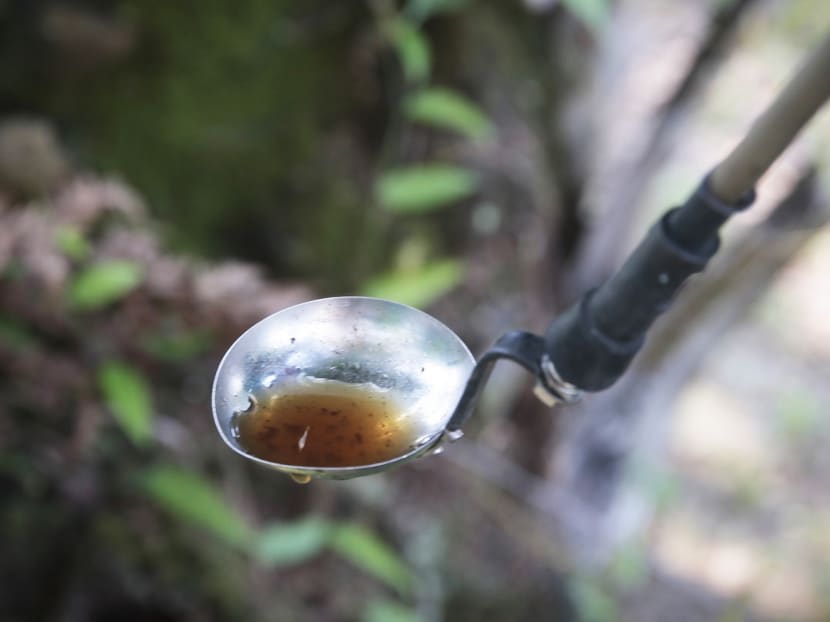Challenge is to stop mosquito breeding in homes: MPs
SINGAPORE — Despite stepping up public education since the Zika outbreak and more stringent enforcement, getting all residents to stem mosquito breeding at home remains a challenge, said Members of Parliament, acknowledging that the message has not sunk in fully.

NEA personnel checking the water for mosquitoes in the Joo Seng Road area. A majority of residents take precautions, but some do so intermittently or overlook some spots, say MPs. Photo: Jason Quah/TODAY
SINGAPORE — Despite stepping up public education since the Zika outbreak and more stringent enforcement, getting all residents to stem mosquito breeding at home remains a challenge, said Members of Parliament, acknowledging that the message has not sunk in fully.
Although a large proportion of mosquito breeding habitats that have been detected are in homes, not all residents are taking the necessary precautions seriously or need to be reminded to do so consistently, they added. While they have ramped up house visits, the MPs noted that up to 60 per cent of households are away during these walkabouts.
Mr Zaqy Mohamad (Chua Chu Kang GRC) said that many residents were unaware that their homes could be potential breeding sites, and there was a need for “sharper” messaging.
“The messaging today is not very explicit (in) saying that most of it (mosquito breeding) is in the homes — people don’t seem to get it,” he said. “The impression is always that it always comes (from) outside, it’s never from my home.”
Although the majority of their residents take precautions, including practising the Five-Step Mozzie Wipeout, some do so intermittently or overlook some spots, said MPs.
“There will be a handful who either don’t see the news, or don’t see the need to take action in their own homes,” said Dr Lee Bee Wah (Nee Soon GRC). “Some people might clear stagnant water after an outbreak, but it’s human nature to forget it after a while.”
Mr Zaqy added that those who followed the steps cannot rid their homes of breeding sites “100 per cent”.
For instance, some breeding sites are found in obscure spots, such as wet patches behind toilet bowls, which are not part of the wipeout, and they may “get blindsided”.
For others, it was a matter of carelessness. Sometimes, said Ms Rahayu Mahzam (Jurong GRC), residents may have left something but forgot to check on it, which can be dangerous.
“We need to keep repeating the message often,” she said.
Over the past few weeks, experts and government leaders have warned that Zika was here to stay and vector control was the most effective defence.
On Sunday, Senior Minister of State (Health) Amy Khor said Zika cases — like dengue, both of which are transmitted by the Aedes aegypti mosquito — would continue surfacing over time. As of Sunday, 63 mosquito breeding habitats were found and eradicated in the Aljunied-Sims Drive cluster — 37 of them in homes and 26 in common areas or other premises.
At Bedok North Avenue 3, another Zika cluster, 52 breeding habitats — 42 of which in homes and 10 in common areas or other premises — were detected and removed. No breeding habitats have been detected in the Joo Seng Road cluster so far.
Residents from Aljunied Crescent said that the authorities were doing enough to combat Zika, and acknowledged that they were more focused on avoiding being bitten than on eliminating breeding spots.
Housewife Joyce Tan, 56, said: “Some people might think that since they are living their lives normally, (the outbreak) is purely due to external factors and may not be bothered to check their homes ... just as long as they take necessary precautions such as spraying and using patches, they think they will be fine.”
Given that the area has more elderly residents, retiree George Lee, 66, said family members need to chip in to spread the message about the seriousness of the Zika virus.
Another resident, 47-year-old drafter Ooi Tai Siong, added that elderly residents may need to be told directly, and in dialect, what needed to be done, since they may not understand the content in the flyers distributed. KENNETH CHENG AND ILIYAS JUANDA











